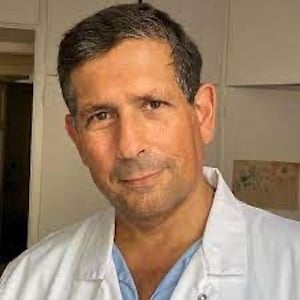
Elie Azoulay is a Professor of Medicine and head of the medical ICU at Saint-Louis Hospital, Paris. Prof Azoulay graduated from Paris-Cité University. He completed his training in pneumonology in 1996 and intensive care in 1999, and he earned a PhD in respiratory physiology in 2002 on chemotherapy and G-CSF-related pulmonary toxicity.
Prof Azoulay has served on the editorial boards of several international journals and as the editor-in-chief of Intensive Care Medicine (2012-2018). His research interests have focused on acute respiratory failure and outcomes in critically ill immunocompromised patients and on communication in the ICU.
He is particularly interested in new therapeutic strategies in onco-haemato-immunology and treating severe infections in immunocompromised patients. Understanding how new drugs lead to survival improvements even when the patients become critically ill, as well as the toxicity profile of these new drugs, is particularly challenging.
In 1996, he launched the FAMIREA multicentre multidisciplinary study group aimed at improving the effectiveness of communication with family members of ICU patients. In 2004, he launched the Groupe de Recherche Respiratoire en Réanimation Onco-Hématologique (GRRR-OH) on the management and outcomes of acute respiratory failure in immunocompromised patients, as well as the Nine-I research group in 2015, a multinational group dedicated to onco-haematology patients.
Prof Azoulay has published more than 500 peer-reviewed articles. He is currently the President of the European Society of Intensive Care Medicine (ESICM).
What are your key areas of interest and research?
I have three main areas of interest and research. First, the management of critically ill immunocompromised patients, with a special interest in acute respiratory failure, severe infections and outcome research. Second, blood diseases in the ICU, whether malignant or not. And last, communication and family-centred care in the ICU.
What are the major challenges in your field?
Intensive care medicine is confronted with several challenges. First, the retention of healthcare professionals and the prevention and mitigation of mental health symptoms are among the most crucial issues. Second, our junior specialists exhibit remarkable talent, having received comprehensive and innovative education and training. They not only bring valuable skills but also emphasise the significance of work-life balance. We must focus on clearly defining how hospitals and ICUs can be more appealing to our younger colleagues and empowering them to envision the future of healthcare. Another challenge involves maintaining the inclusion of clinical medicine in the intensive care curriculum. ICU specialists are proficient in life-sustaining therapies and must be well-versed in understanding pathophysiology, diagnostic workup, therapeutic targets, and outcomes. Solid medical knowledge is essential to foster effective communication with specialists and utilize the ICU's therapeutic arsenal judiciously for the right patients.
What is your top management tip?
Be decisive.
What would you single out as a career highlight?
The privilege to have met passionate and inspiring people.
If you had not chosen this career path, you would have become a…?
Novelist.
What are your personal interests outside of work?
Idling.
What is your favourite quote?
“Worrying is like praying for something you don't want to happen".























